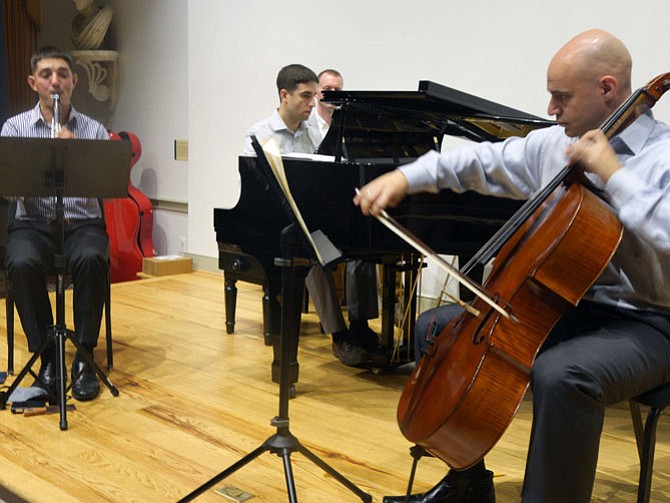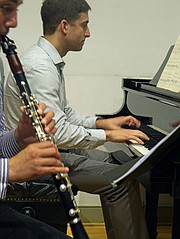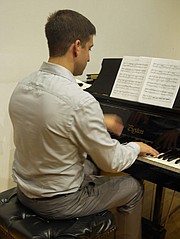Benjamin Wensel, cello, and Rogelio Garza, clarinet, join Daniel Campolieta on piano with Matthew Richardson on vocals. Photo by Shirley Ruhe.
Daniel Campolieta remembers when he was about four years old his mother attached numbers with masking tape to the keys on a little plastic keyboard. "She wrote out the accompanying numbers for my favorite songs in a book — like the Ninja Turtles theme song." Campolieta's mother was a piano teacher and noticed he seemed to like it so his piano career started from there.
Campolieta was practicing for his performance for the 26th Annual Chamber Music Series at the Lyceum on July 31 with cellist Benjamin Wensel, clarinetist Rogelio Garza and Matthew Richardson as tenor. The Washington Metropolitan Philharmonic Association sponsors this series. In addition to works by Lauridsen and Genzmer, they performed Seven Sketches written by Campolieta. He said,
"It is a classical-jazz crossover,” he said. “Each sketch has a slightly different flavor and lasts for a minute. Most are notated but there is some improvisation. The transition can be jarring but it seems to work." Campolieta explains that this piece was written in 2009 and has evolved. He wrote the first part which is now number five in the sketches and, "it was two minutes long and I was done. I thought what if I structure the whole piece like that in two-minute parts."
Garza comments things sound so much better in this Lyceum room. The group had practiced together a couple of times earlier in the week. Garza said, "Things are really clicking today. The rest of this one is fine."
Wensel said, "I'd like to take one more pass on this part. Could we start a little before F and go through 90ish?"
Campolieta, Wensel and Garza are all colleagues in the U.S. Army band but have not played together before as a group. They are able to synch easily because, "we trust each other." In addition to the U.S. Army band and various concerts, Campolieta says he "substitutes at churches all over the place and last night I played at a wedding reception."
Campolieta's fingers dance through mid-keyboard. Garza's body leans back in his chair and Wensel nods his head as a discordant note is followed by a pause moving into a haunting clarinet. Campolieta says he composed his first piece in high school to a Walt Whitman poem set for a men's chorus. "They let me conduct it and I thought wow, I created this and got to hear it." Then in college a friend asked him if he wanted to go half and half on a recital. "I thought, cool, what do I write for voice and piano."
Campolieta said, "Composing is weird. Some days I wake up and it's there and I have to write it down fast on a napkin. Other times I have to compose a request by a certain date and I may sit down and see if it will come. It might take four hours to get eight measures but if it is the right eight measures, it is worth it."
He says since composition is not his living, he is fascinated by the process. Campolieta has written a number of choral pieces and several chamber pieces as well as liturgical compositions for churches. He has had one piece published so far based on Emily Dickinson's poem "Will There Really be a May."
Being a pianist, sometimes he just improvises. "But sometimes I just sit there and think outside the piano, it sounds like meditating, and see if something comes. Sometimes it just explodes and happens all at once and sometimes it takes over a year. I view these as unfinished works."


